The Last Emperor 4K Blu-ray Movie
HomeThe Last Emperor 4K Blu-ray Movie 
Theatrical (4K/BD) and Television (BD) Versions / 4K Ultra HD + Blu-rayCriterion | 1987 | 1 Movie, 2 Cuts | 163 min | Rated PG-13 | Aug 13, 2024
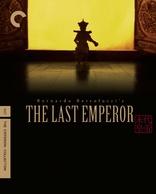
Movie rating
8 | / 10 |
Blu-ray rating
| Users | 0.0 | |
| Reviewer | 5.0 | |
| Overall | 5.0 |
Overview
The Last Emperor 4K (1987)
The life of Emperor Pu Yi, who took the throne at age three, in 1908, before witnessing decades of cultural and political upheaval, within and without the walls of the Forbidden City.
Starring: John Lone, Joan Chen, Peter O'Toole, Ruocheng Ying, Victor WongDirector: Bernardo Bertolucci
| Drama | Uncertain |
| Period | Uncertain |
| History | Uncertain |
| Epic | Uncertain |
| Biography | Uncertain |
Specifications
Video
Video codec: HEVC / H.265
Video resolution: 4K (2160p)
Aspect ratio: 2.35:1
Original aspect ratio: 2.39:1
Audio
English: DTS-HD Master Audio 2.0 (48kHz, 24-bit)
English: DTS-HD Master Audio 2.0
Subtitles
English SDH
Discs
Blu-ray Disc
Three-disc set (3 BDs)
4K Ultra HD
Playback
Region A (locked)
Review
Rating summary
| Movie | 5.0 | |
| Video | 4.5 | |
| Audio | 5.0 | |
| Extras | 5.0 | |
| Overall | 5.0 |
The Last Emperor 4K Blu-ray Movie Review
Reviewed by Dr. Svet Atanasov July 14, 2024Bernardo Bertolucci's "The Last Emperor" (1987) arrives on 4K Blu-ray courtesy of Criterion. The supplemental features on the release include archival audio commentary with Bernardo Bertolucci, producer Jeremy Thomas, screenwriter Mark Peploe, and composer-actor Ryuichi Sakamato; multiple documentaries; archival interviews; vintage trailer; and more. In English, with optional English SDH subtitles for the main feature. Region-Free.
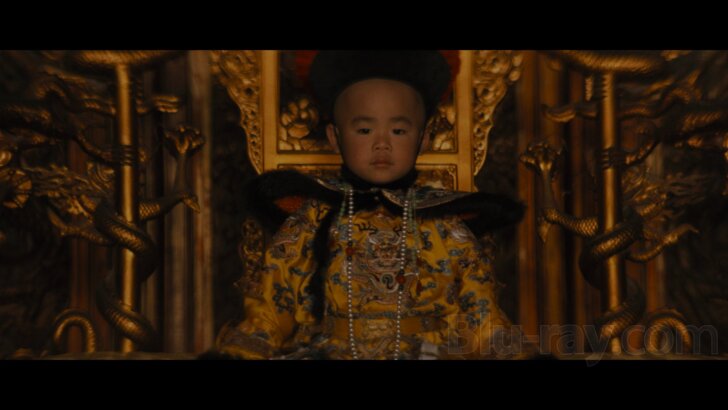
At the age of 3, Pu Yi (John Lone) is taken away from his mother, sent to the Forbidden City and crowned Emperor of China. He is not allowed to interact with the outside world. As time goes by, Pu Yi becomes more and more frustrated with the cannons he is expected to respect.
Outside the Forbidden City, the world is quickly changing. The Japanese Army invades China and Manchuria; then Mao’s forces take over. In the beginning, Pu Yi is spared from the political turmoil, but he is eventually sucked into it. A British mentor (Peter O’Toole) arrives to the Forbidden City and inspires the Emperor to begin searching for a new identity. Pu Yi also marries a beautiful girl (Joan Chen).
Pu Yi abdicates in 1912. Later, he returns to Manchuria, hoping to be an Emperor again, but is tricked by the Japanese invaders and consequently, after WW2 comes to an end, captured by the Red Army. The last Emperor is then transferred to a Chinese prison where the communists begin to question his history with the Japanese.
The Last Emperor is Bernardo Bertolucci’s most highly-decorated picture. Visually, it is a stunning tour de force, which few of its contemporaries, if any, could rival. It is also Bertolucci's -- a passionate Marxist -- most elegant yet uncompromising critique of absolute power.
Despite the fact that The Last Emperor chronicles an incredibly dramatic story, referencing to a number of key political events from the beginning of the century, its tone is notably intimate. In fact, Pu Yi’s struggle to adapt to the world he has been kept away from, and consequently change it according to his vision, seems uncannily subdued. Not surprisingly, The Last Emperor is filled with a number of protracted close-ups where Pu Yi’s face is examined -- pain, joy, disappointment and elation are captured by Bertolucci, without resorting to high-powered lines.
Still, even though Bertolucci spends an enormous amount of time on Pu Yi and his maturation as a leader, his persona remains a perplexing enigma. There are controversial decisions the Emperor produces while juggling with the colonial interests of the Japanese, and later, Mao’s communists, that are difficult to fully comprehend. Logically, Bertolucci’s quiet but thorough examination of Pu Yi’s history enhances even more the divisive elements in his legacy.
The Last Emperor has been shown to audiences around the world in two different versions -- a shorter version (164 min), also referred to as the Theatrical Cut, and a longer version (218 min), which was reconstructed for Italian TV. I’ve seen both and frankly have a difficult time deciding which is the more compelling one. The theatrical cut maintains a steady tempo, which given the story’s episodic structure is probably the preferred way to see this film. I would also say that it links a lot of the political events I mentioned earlier without dramatically widening the gap between Pu Yi‘s political and personal lives. On the other hand, the TV version adds substantially more, particularly in regard to Pu Yi’s childhood years. However, here Bertolucci also elaborates on a lot of the political intrigues from the second half of The Last Emperor. As a result, the intimate tone of the story is substantially weakened.
Nevertheless, The Last Emperor remains a poignant account of a historic figure whose rise and fall at a time of great political turmoil are unquestionably fascinating to behold. Furthermore, the film effectively dispels a number of myths about absolute power that, somewhat ironically, are still alive and well in the Emperor’s homeland.
The Last Emperor 4K Blu-ray Movie, Video Quality 
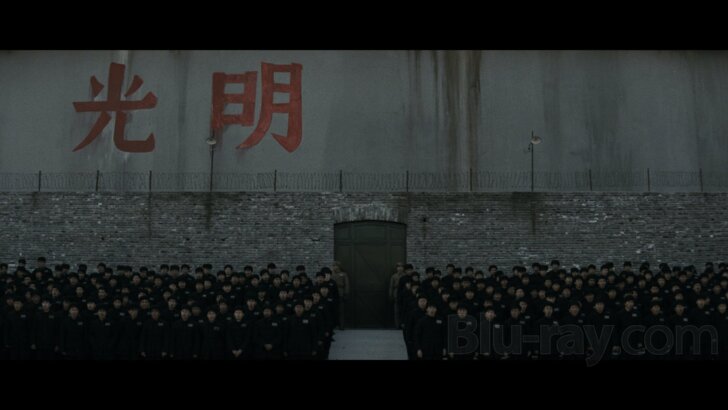
Criterion's release of The Last Emperor is a 4K Blu-ray/Blu-ray combo pack. The 4K Blu-ray, which presents the Theatrical Cut of the film, is Region-Free. However, the Blu-ray, which presents the TV Version of the film, is Region-A "locked".
Please note that some of the screencaptures that appear with this article are taken from the 4K Blu-ray and downscaled to 1080p. Therefore, they do not accurately reflect the quality of the 4K content on the 4K Blu-ray disc, including the actual color values of this content.
Screencaptures #1-15 are from the 4K Blu-ray.
Screencaptures #18-32 are from the Blu-ray.
The release introduces a new 4K restoration of the Theatrical Cut of The Last Emperor, which can be viewed with Dolby Vision and HDR grades. I chose to view it with Dolby Vision. I tested different areas of the TV Version as well.
The Last Emperor made its high-definition debut with this Blu-ray release in 2009, which was also produced by Criterion. I still have it in my library. I also have this Region-B Blu-ray release that StudioCanal produced in 2010.
The new 4K makeover, which is framed in 2.35:1, gives the film a very healthy and attractive organic appearance that is quite impressive in native 4K. It is true that the film is a visual stunner too, but the strength of the new presentation is undeniable. Its superiority over that of the original Blu-ray release is undeniable, too. For example, in native 4K, all visuals convey stronger density levels. Also, fluidity is dramatically improved. On a large screen, just these two upgrades make quite a difference because the entire film is very carefully lensed and even the tiniest imperfections can be quite easy to spot. However, there is a lot more to like on the new 4K makeover. In many darker areas, for instance, shadow definition is improved, further enhancing the superior depth as well. While the original Blu-ray release still produces a solid presentation of the film, in some areas small limitations of the previous master make it impossible to reproduce identical delineation and depth. Color reproduction is fantastic. All primaries and supporting nuances are wonderfully balanced and looks exceptionally vibrant and healthy. The Dolby Vision grade handles dark areas very well, plus many highlights look much more convincing now, too. Image stability is excellent. I did not notice any encoding anomalies to report in our review.
Perhaps unsurprisingly, the long TV Version does not look as good as the Theatrical Cut. It has a dated appearance. However, even with all inherited limitations, I would say that this presentation is preferable if compared to the one from the StudioCanal release.
The Last Emperor 4K Blu-ray Movie, Audio Quality 
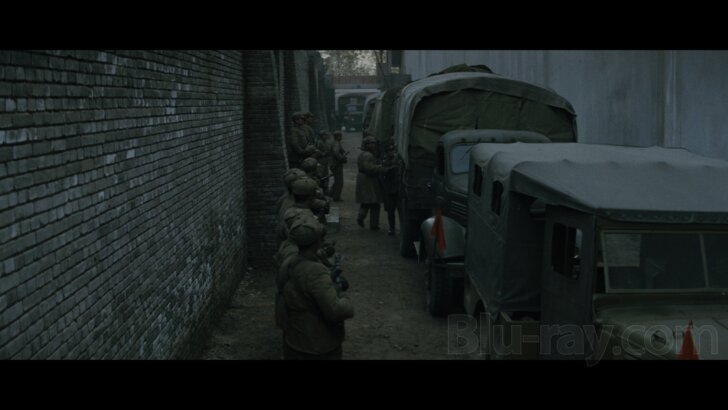
There are two standard audio tracks on this release: English DTS-HD Master Audio 2.0 (for the Theatrical Cut) and English DTS-HD Master Audio 2.0 (for the TV Version). Both versions of the film can be viewed with optional English SDH subtitles. When turned on, they appear inside the image frame.
The DTS-HD Master Audio 2.0 track is outstanding. It produces rich dynamic contrasts with excellent nuances that can easily surprise viewers expecting the 2.0 track to have a somewhat limited range. Of course, the original sound design should be credited too, but I think that the lossless track performs exceptionally well. I did not encounter any anomalies to report in our review.
The Last Emperor 4K Blu-ray Movie, Special Features and Extras 
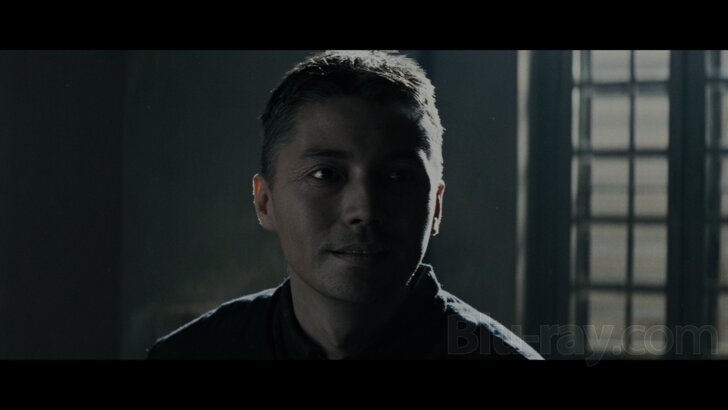
4K BLU-RAY DISC - THEATRICAL CUT
- Commentary - this audio commentary with Bernardo Bertolucci, producer Jeremy Thomas, screenwriter Mark Peploe, and composer-actor Ryuichi Sakamato was produced by Mark Rance between 2003 and 2007. It offers an in-depth analysis of the film and its production history. It also appears on the Criterion Blu-ray release of The Last Emperor.
- Commentary - this audio commentary with Bernardo Bertolucci, producer Jeremy Thomas, screenwriter Mark Peploe, and composer-actor Ryuichi Sakamato was produced by Mark Rance between 2003 and 2007. It offers an in-depth analysis of the film and its production history. It also appears on the Criterion Blu-ray release of The Last Emperor.
- The Italian Traveler, Bernardo Bertolucci - this archival documentary, produced by Fernand Moszkowicz, assistant director on Last Tango in Paris, examines Bernardo Bertolucci's geographic influences and their representation in his work. A large section of the documentary is dedicated on the production of The Last Emperor. In French, Italian, and English, with English subtitles where necessary. (54 min).
- Postcards From China - presented here is raw footage from Bernardo Bertolucci's trip to China in 1985, where he researched landscapes, faces, and atmosphere. The footage, which was shot by Bertolucci, can be viewed with an optional audio commentary. In Italian, with English subtitles. (8 min).
- Bernardo Bertolucci's Chinese Adventure - this archival documentary chronicles the production of The Last Emperor. It was made by Paolo Brunatto on the set of The Last Emperor in 1986. In Italian and English, with English subtitles where necessary. (51 min).
- Making The Last Emperor - this archival documentary gathers interviews with cinematographer Vittorio Storaro, editor Gabriella Cristiani, costume designer James Acheson, and art director Gianni Silverstri, who worked closely with the late production designer "Nando" Scarfiotti. In Italian and English, with English subtitles where necessary. (46 min).
- The Southbank Show - presented here is an archival episode of Britain's The Southbank Show, shot on location in Beijing, which focuses on the conception and production of The Last Emperor. In English and Mandarin, with English subtitles where necessary. (67 min).
- David Byrne - in this archival program, composer David Byrne discusses his contribution to The Last Emperor. The program was produced for Criterion in New York City in 2007. In English, not subtitled. (26 min).
- Beyond the Forbidden City - in this archival program, cultural historian Ian Buruma discusses China's more recent history and some of the key events and figures that impacted the life and reign of Pu Yi. In English, not subtitled. (46 min).
- The Late Show: Face to Face - presented here is an archival episode of the British television arts magazine The Late Show: Face to Face in which host Jeremy Isaacs discuses with Bernardo Bertolucci his Oscar award for The Last Emperor. The episode was broadcast in 1989. In English, not subtitled. (31 min).
- Trailer - presented here is a vintage trailer for The Last Emperor. In English, not subtitled. (3 min).
- TV Version - presented in English, with optional English SDH subtitles. DTS-HD Master Audio 2.0. 1080p. (218 min).
- Bonus Features - there are no bonus features on the Blu-ray disc.
- Booklet - an illustrated booklet featuring an essay by film critic David Thomson, a reminiscence by Bernardo Bertolucci, interviews with production designer Ferdinando Scarfiotti and actor Ying Ruocheng, and an essay by Fabien S. Gerard, as well as technical credits.
The Last Emperor 4K Blu-ray Movie, Overall Score and Recommendation 
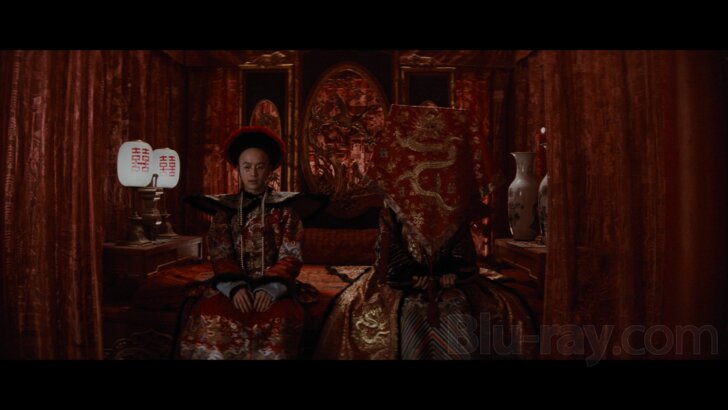
A visual stunner, Bernardo Bertolucci's The Last Emperor is a fascinating film, mixing history with drama in a somewhat controversial fashion. The story of Pu Yi, the last of the great Chinese rulers, is told through a series of flashbacks highlighting key events from his coronation to his imprisonment by Mao's followers. This upcoming combo pack release introduces a terrific new 4K restoration of the Theatrical Cut of The Last Emperor in its original theatrical ratio, as well as the much longer TV version of the film, which was not included on Criterion's original Blu-ray release. VERY HIGHLY RECOMMENDED.
Similar titles
Similar titles you might also like

Nixon
Election Year Edition
1995

The Iron Lady
2011

The Irishman
2019

Che: Part One
2008

The Queen
2006

Malcolm X 4K
1992

Hunger
2008

The Bridge on the River Kwai
1957

Mandela: Long Walk to Freedom
2013

Barry Lyndon 4K
1975

Schindler's List 4K
25th Anniversary Edition
1993

The Last King of Scotland
2006

The Social Network
Collector's Edition
2010

Che: Part Two
2008

The King's Speech
2010

John Adams
2008

Gandhi 4K
1982

J. Edgar
2011

Winnie Mandela
2011

Nicholas and Alexandra
Limited Edition to 3000 - SOLD OUT
1971

